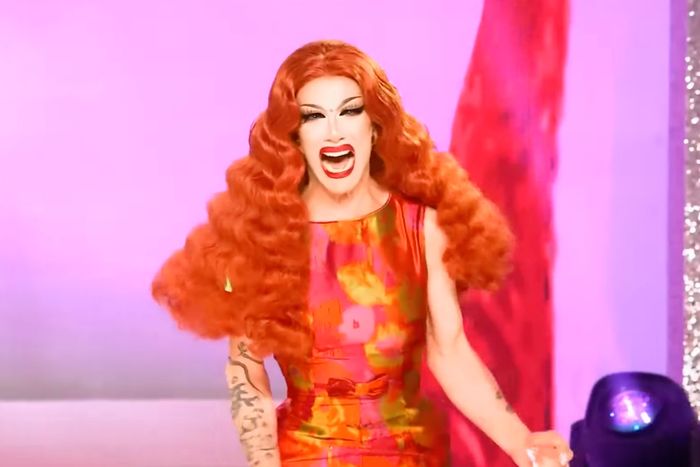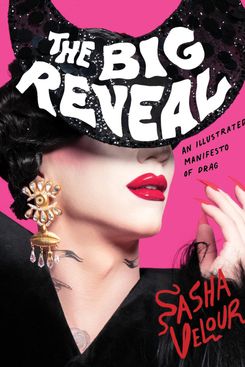
Sasha Velour, winner of the ninth season of RuPaul’s Drag Race, predicts another triumphant Sasha this season: “I think Sasha Colby will win and deserves it. She is the past, present, and future of drag to me.” As this season ends, Sasha Velour is out with a new book, The Big Reveal: An Illustrated Manifesto of Drag. It comes at a moment when drag is hugely popular and conservative politicians are pushing to vilify and criminalize it. “They’ve never stopped us from existing before,” she says. “Things may be bleak and painful, but drag is still going to be here, and it’s going to be fucking fierce.” Read an excerpt of the conversation below or listen to the full episode of Into It wherever you get your podcasts.
In this book, you tell many stories from your life as well as a history of all drag going back to the Mesolithic Age. What does it feel like to write about drag at this moment when politicians are actually making drag illegal?
It has exceeded, or disappointed, even my biggest expectations for where culture would be. But I did know that we would be in a moment where we would be defending the right of queer and trans people to exist, the freedom of young queer people to find resources and find information. I think the writing has been on the walls for the last couple of years with the attacks against trans medical care and reproductive freedoms for women. These things always go together. And for better or for worse, drag is a stage where we bring these conversations to light and experience the results of the legal and cultural oppressions of the time.
If drag is more popular now than it’s ever been, why is it under attack at the same time?
That’s probably why: because it became so visible. We take steps forward and then get pushed backward. The excitement around drag has inspired people of all ages who are discovering drag for the first time and falling in love with it, and that inspires a freer attitude. Drag is advocating for changes to happen in society, to make room for more kinds of voices, for different kinds of art, different kinds of queer people to be in the spotlight. We’re seeing it everywhere.
Has anything about the way politicians have recently come after drag surprised you, or does the playbook feel familiar?
I guess it just surprises me how old fashioned it is that people can still fall for accusations of drag being too sexual or perverse for young people. So much of culture is filled with sexual imagery, and drag is, if anything, tamer than ever these days.
It’s also a caricature of sexuality. When I see drag, I’m not seeing queens saying, Look at how sexy and lusty I am. What they’re saying is, Isn’t this all kind of funny? Aren’t these boobs funny? Isn’t this butt funny? Isn’t this makeup funny? What is gender? What is sex? Right?
And fabulous and joyful, too. Maybe the butt is funny, but it also makes you feel great, so go for it. You do it for yourself, not to arouse people, necessarily. Maybe what you’re doing for yourself does make someone else think in a new way, and that’s great. But we’re all just living our own fantasies and encouraging other people to do the same.
When did you start doing drag?
I started drag as a child. When I was 4 years old and saw The Wizard of Oz, I wanted to become the Wicked Witch of the West. I just identified with her.
Not Dorothy.
Yeah, fuck Dorothy. I’m like, That tourist destroyed that poor green lady’s sister and stole her clothes. Like many young, gay kids, despite everyone’s fear of this character, I fell in love with her. I started performing for my parents, and I would insist on doing shows if they had people over. I would do the death of the Wicked Witch. I would have a volunteer who would mime hurling the bucket of water on me. And I would find some blanket and then shrivel down screaming and then crawl out of it and be like, “She’s dead. That’s the end.”
Go back to the first drag performance you did where you felt like, Oh, I’m really good now. Everything is falling into place. Was there a certain performance where it clicked?
I developed a Gollum performance that I’ve performed all over the world. It starts with a bunch of performances about love and becomes about someone else having the engagement ring that I’m dreaming of, and that is the catalyst for me becoming Gollum. It’s a beautiful transformation from a glamorous 1950s ingenue to Gollum. And then, of course, in that famous scene from Lord of the Rings, Smeagol kind of frees themself from this ring-obsessed voice. And then I performed Kate Bush, “Wuthering Heights,” as Gollum with the full choreography that she does. That was a Halloween special. I started getting booked all through the month of October. Bob the Drag Queen gave me my first Manhattan booking because of that number.
These days, drag feels so much more mainstream. A few years ago, when Drag Race was really hitting its stride, my colleague Alex Jung wrote about how the success of that show and the success of drag would present a challenge to the culture itself and what happens when a subculture becomes mainstream. Does the mainstreaming of drag feel like a problem to you, or is it just good?
Perhaps the fear coming from the subculture is that we don’t want to lose track of what makes our art so special and important to us. It is a home and a necessary opportunity for people who don’t have other advantages, for people who need drag simply to have a platform at all. And perhaps, as our art becomes part of mainstream culture, we see mainstream power imbalances and hierarchies come into our world. Like how we’re going to make sure that drag is not limited to people who come from money with connections, people who are young or fit conventional ideas of beauty or attractiveness. Drag is a space for disruptors and for people with great ideas who don’t have those resources of various kinds. Because I think, at its best, what drag offers is possibilities beyond that. That’s the challenge as it becomes part of mainstream culture: In the attempt to appeal to mainstream audiences, sometimes we try to look identical to mainstream pop culture. I think that we’re best when we’re a wink and a brush-off away from the norms that are accepted.
Who do you most need or want to read your book and why?
I imagined lots of different people reading this book. I read it pretending to be a radical activist who feels like drag is too commercial. I read it as a grandma who worries it’s too shocking. I just want people to be surprised and to give it a try. I wonder what someone, like a young person like me, would think reading this book. I know how much this would have spoken to me as a kid. Or as even a teenager or in my 20s, I needed something like this. So if it can reach someone like myself anywhere in the world of any background, I think that would be a success.
The finale of this latest season of Drag Race is April 14. If I don’t ask you for a prediction, I won’t have done my job. Who’s going to win?
I think Sasha Colby will win and deserves it. She is the past, present, and future of drag to me. I mean, I do love them all. I’ve gotten to know Luxx a little bit here in Brooklyn, I love Mistress, and Anetra is obviously a superstar. But I’ve been rooting for Sasha Colby for a long time.


